Birzeit education professor, MA alumna win award for research on virtual teaching in physics labs
Dr. Ahmad Aljanazreh, an assistant professor at Birzeit University’s Department of Curriculum and Instruction, and MA Birzeit alumna Ghadeer Hamed, have received the 2020-2021 Sheikh Faisal Bin Qassim Al Thani Award for Education Research for their research paper on “The Effectiveness of Using Virtual Experiments on Students’ Learning in the General Physics Lab.”
The paper, published in the Journal of Information Technology Education, is based on Hamed’s thesis for the master’s program in education, which was supervised by Aljanazrah.
The award is granted by Al Faisal without Borders Foundation, in partnership with the College of Education at Qatar University, for distinguished scientific research by academic staff and graduate students to promote knowledge production and improve educational practices and policies.
The study by Hamed and Aljanazreh showed that using virtual experiments in general physics labs is as effective as face-to-face teaching. Students who acquired their knowledge on e-learning platforms, the authors argue, are better prepared to carry out real-world experiments.
The researchers note that their study serves both as a solution and a continuation to the debate in academic literature on the power of conducting virtual experiments as a substitute to face-to-face education in labs. “Even if virtual experiments can’t fully replace in-person education in labs, we still need to design effective learning environments that are more aligned with developments in the digital age,” said Al Janazreh. “This helps students acquire knowledge and practical skills in a more flexible way.”
In order to test and substantiate their claims, the researchers compared how two groups of students — one control and one experimental; each composed of 45 students — performed after learning through face-to-face and virtual lab experiments, with tests applied after both groups finished the course. Not only did both groups perform comparably, but the experimental group emerged with a deeper understanding of the material because, in part, they had access to online learning resources and videos that they could use anywhere, at any time, and according to their own pace of learning.
The authors conclude with a recommendation that academics employ more virtual lab experiments and include more interactive multimedia activities in their courses, leading to a richer, more flexible learning environment.
The complete study can be viewed here.







